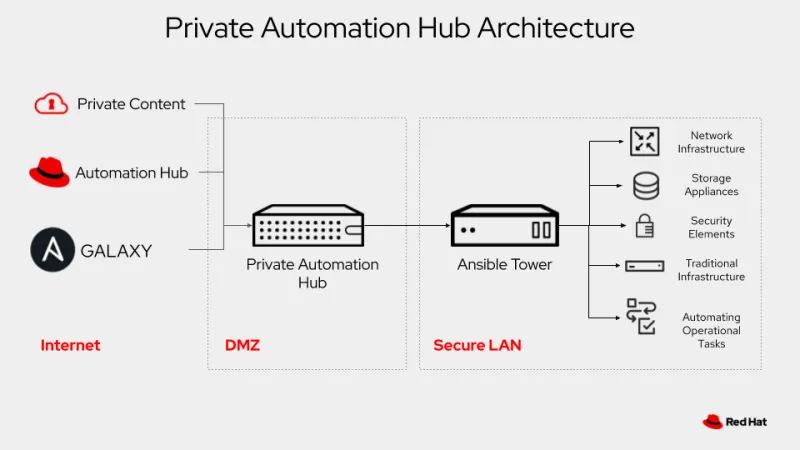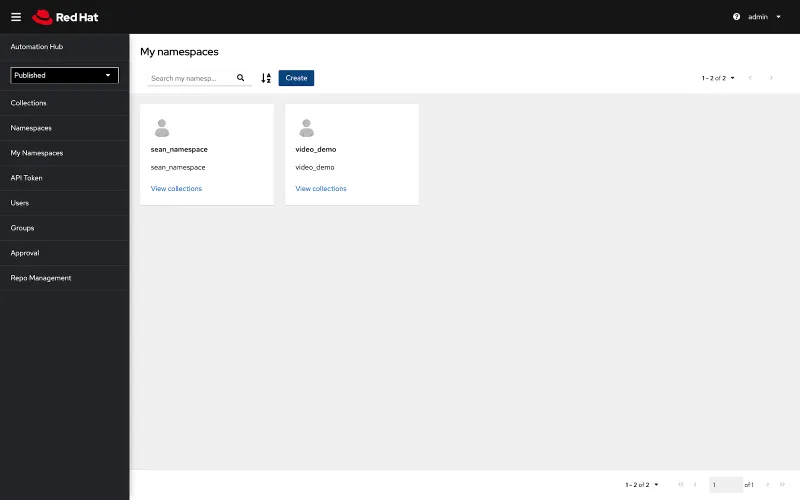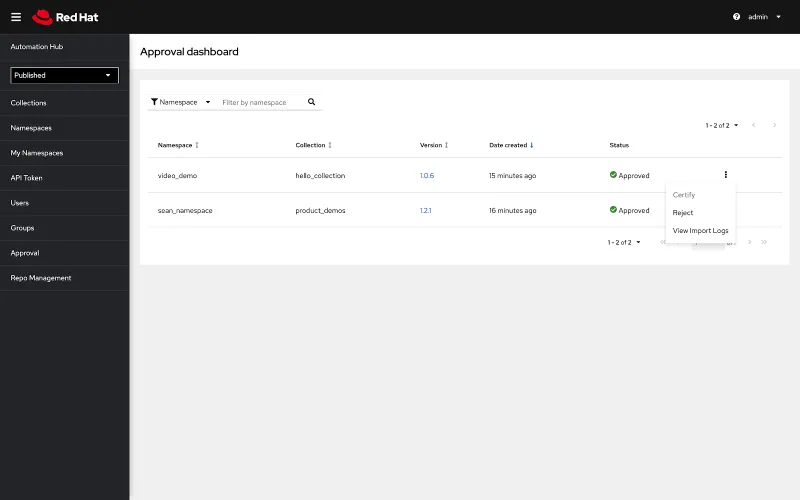Private Automation Hub will be included as part of Red Hat Ansible Automation Platform release 1.2, providing an easier way for our customers to manage their Ansible content. Whether they produce private content, access trusted and supported content from Red Hat or obtain content from third party or other community sources, an internally controlled capability is essential to support the continued growth of automation. As automation becomes critical to managing IT activities, so too becomes the need to have a focal point where collaboration can be encouraged, content shared and trust reinforced.
Private Automation Hub is a self-hosted Ansible content management system. Organizations can host private hubs on their own infrastructure and manage it themselves. Similar to how Red Hat Satellite enables Red Hat Enterprise Linux customers to manage operating system content, private Automation Hub enables automation teams to manage Ansible automation content. Private Automation Hub allows curation and distribution of Ansible content as close as possible to Ansible Automation Platform clusters. Private Automation Hub is included in the Red Hat Ansible Automation Platform subscription.

Ansible content can be broken up into three main categories:
- Community content found in Ansible Galaxy
- Red Hat certified and supported content found in Automation Hub (on cloud.redhat.com)
- Private content created and curated by an organization and shared locally
Private Automation Hub allows management of all three types of content, choosing which Ansible Content Collections, and which versions, are made available to automation consumers.
All Ansible content is organized as Ansible Content Collections. Ansible Content Collections are simply a standard directory structure of Ansible content, including, roles, plugins and modules, stored in a tar.gz file. Private Automation Hub, just like hosted Automation Hub, which can be viewed on cloud.redhat.com, sorts collections into namespaces. So for an easy example, the ec2_key module for Amazon Web Services is stored in the namespace amazon, in the collection aws. In order to use the ec2_key module, the FQCN or fully qualified content name would be amazon.aws.ec2_key.
Private Automation Hub allows administrators to build private namespaces and collections, and then allows Ansible Automation Platform clusters to authenticate and retrieve content from them on-demand. This content can also be ordered so that Ansible projects always choose content from Automation Hub before using unsupported content in Ansible Galaxy.

Content has a level of governance inside of private Automation Hub. Content is staged and can be certified or rejected by administrators. Ansible Automation Platform clusters sync to private Automation Hub using the credentials feature and a new Automation Hub credential type where the API token can be input.

Finally, private Automation Hub can also sync existing content from both the community (Ansible Galaxy) and supported and certified content from Automation Hub on cloud.redhat.com. This content can be chosen on a per collection basis so that administrators can filter which collections are made available to their automation consumers.

Where to go next?
I hope this blog helped outline private Automation Hub and where it fits into your automation infrastructure. We believe that private Automation Hub can help organizations manage, share and curate automation content. The hosted service offering Automation Hub is now extended into private networks with a self hosted option.
Private Automation Hub is part of the Red Hat Ansible Automation Platform 1.2 release and included in your download on red.ht/try_ansible.
Sull'autore
Sean is a Principal Technical Marketing Manager, Ansible, where he brings over 10 years of experience building and automating computer networks. Sean previously worked for both Cumulus Networks (acquired by Nvidia) and Cisco Systems where he helped customers deploy, manage and automate their network infrastructure. He resides in Chapel Hill, NC with his wife and children and tweets from @IPvSean.
Altri risultati simili a questo
How sovereign is your strategy? Introducing the Red Hat Sovereignty Readiness Assessment tool
Friday Five — February 13, 2026 | Red Hat
Data Security And AI | Compiler
Data Security 101 | Compiler
Ricerca per canale
Automazione
Novità sull'automazione IT di tecnologie, team e ambienti
Intelligenza artificiale
Aggiornamenti sulle piattaforme che consentono alle aziende di eseguire carichi di lavoro IA ovunque
Hybrid cloud open source
Scopri come affrontare il futuro in modo più agile grazie al cloud ibrido
Sicurezza
Le ultime novità sulle nostre soluzioni per ridurre i rischi nelle tecnologie e negli ambienti
Edge computing
Aggiornamenti sulle piattaforme che semplificano l'operatività edge
Infrastruttura
Le ultime novità sulla piattaforma Linux aziendale leader a livello mondiale
Applicazioni
Approfondimenti sulle nostre soluzioni alle sfide applicative più difficili
Virtualizzazione
Il futuro della virtualizzazione negli ambienti aziendali per i carichi di lavoro on premise o nel cloud
